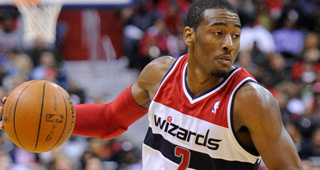A week ago Monday, the Washington Wizards made more field goals from the field while taking less shots, did better at the free throw line in both makes and percentage, nearly tripled the Sacramento Kings up in second chance points (13-5), and outrebounded Sacramento by ten. Still, they lost the game on a late Isaiah Thomas two-pointer.
The reasons the Wizards lost the game are both understandable considering their youth and lack of time playing as a full unit and frustrating considering they were going for their sixth-straight home win. By far the biggest culprit was an appalling amount of turnovers. After the game, Randy Wittman pointed to the stat that the team actually had more turnovers than assists (an interesting figure but they were actually tied at 20) which obviously works as a negative indicator. What made the turnovers even worse in context is that the 20 TO’s led to 23 points for the Kings, many of which came in the first half when Sacramento could not buy a basket in their half-court offense. As someone who has watched a fair amount of the Kings the past few seasons, one of the things that make them distinct is that they have players who a team would be fine to leave open from distance and those who are deadly to handle in that way but the players on the team do not behave like they know which group they are in. That means that good teams can use Sacramento’s bad shot selection against them and make their offense less efficient and effective by knowing who to handle in what way.
In the first half, Washington actually did a pretty decent job of this in half-court sets despite the Kings dropping 53 points in the half. Players like John Salmons had trouble finding their place and it gave the Wizards a meaningful advantage. Part of the reason the score ended up so high was the aforementioned turnovers: despite being an athletic team, Washington was largely unable to stop the Kings from scoring in transition, a predicament often precipitated by an offensive mistake on their part. These issues got compounded in the second half when the Kings kept up some momentum on O while Washington’s offense disintegrated into bad rotations and shots, which Wittman talked about at some length post-game.
While these mistakes are frustrating, the nice thing is that they are largely correctable with experience, coaching, and advance scouting. One of the more remarkable components of the Wall/Beal chemistry thus far has to be the lack of time it has taken to develop: the two have been on the court together for a total of about 150 minutes. Jared Durbin at HoopChalk did an excellent job this week on the effect of John Wall on Bradley Beal and the rest of the Wizards, so I’ll let his work speak for itself for right now.
Wall stands out among the new generation of point guards in the league because he uses his athleticism mostly to create for others at the early part of his career. It has taken athletic freaks like Russell Westbrook and Derrick Rose longer into their NBA tenures to convert in this way. Some of this inevitably stems from Wall’s lack of a reliable jumper, which sort of flips the script on the new normal of NBA PG development. That weakness fits in relatively well when accounting for Beal’s strengths and also means that the team should focus on SF’s that can shoot more than slash when looking for the long-term starter even though John Wall absolutely can develop a jumper that keeps defenses honest.
The other reasons the Wizards should be hopeful is just how astonishingly young their overall rotation is at the moment. Of the bench players who get meaningful minutes, the only ones older than 24 are Trevor Ariza at 27 and AJ Price at 26. That means that one would expect the existing players to get better even without infusions of talent through the draft, trades, and potentially cap space.
While losses like the one to Sacramento are incredibly frustrating and preventable, the potential of eventual success takes much of the sting away, particularly when losing now means a whole lot less than a silly defeat in a future season where the squad is playing for a spot in the postseason.



